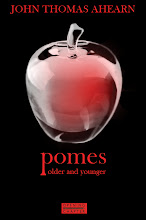
There have been Dark ages before,
desolate, evil times when humanity
seemed in full retreat, when death
held sway, brought the bethels
plague, superstition, vanity,
greed, starvation, and incessant war.
Once they’re Ages, we can call
them Dark, or Space, or any name
we please, if only to disguise
how little differs otherwise,
how much the ages stay the same;
the Ice melts slowly, if at all.
There’s precious little really New
about our Gilded, Digital day.
Wonders have become routine;
in the Glacial hush of sleek Machines
we scrape along in the usual way,
sharp Stone, tight shoe.
We haggle with the universe,
despite our Faith in the Iron rule
that none of our overwhelming questions
will ever give the faintest suggestion
of having disturbed a molecule.
We Moderns are nothing if not perverse.
Through the rooms we come and go,
talking of “Wolfy,” with a “V,”
our Anxiety fully guaranteed
in megahertz at Enlightenment speed.
We’ve all seen what there is to see,
we’ve all seen the Video.
An Age of Miracles is past
when miracles are commonplace:
surely a new perspective is at hand.
Surely we’ll learn to decipher the face
in which our own chronicles are cast,
our own hour come round at last.













































4 comments:
An interesting word rhythem, John, from the outer coming in, much like the picture.
It's only that the last stanza doesn't follow the pattern. Deliberate? You've got me thinking.
You've evoked a strong sense of what many scientists must feel after decades of tireless work.
I like that reference to Eliot - 'Through the rooms we come and go'
and the former 'Moderns' too ;)
A bit W.H Auden, I'm thinking, but that might be because I'm reading him at present...
Provoking and enjoyable too!
Shameless, yes, the pattern is broken in the last stanza, as a way of inviting the paradigm shift it talks about, and also to provide a terminal couplet. It's a stanza form I use quite a bit, no looser than any, but with an informal sound owing to the distance between the AB lines and the BA. I don't know whether I invented it or not, but I do like it, and when necessary, break it. You'd be amazed at how often it goes completely unnoticed. Good eye.
Cailleach, you've got me. Auden is a favorite of mine, as I'll make clear when his centenary arrives on the 21st. Meanwhile, when an acute reader suggests something I've written sounds a bit like him, I can only tug my forelock and mumble thanks.
Powerful poem, John and so very true.
Post a Comment